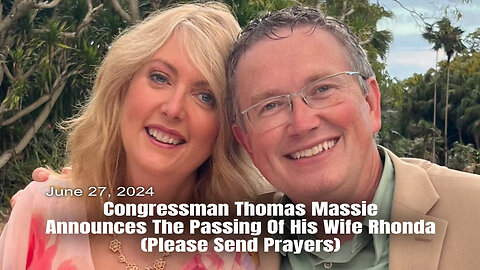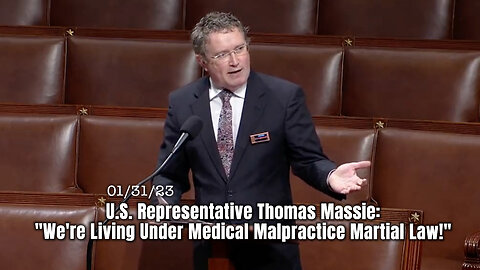Premium Only Content
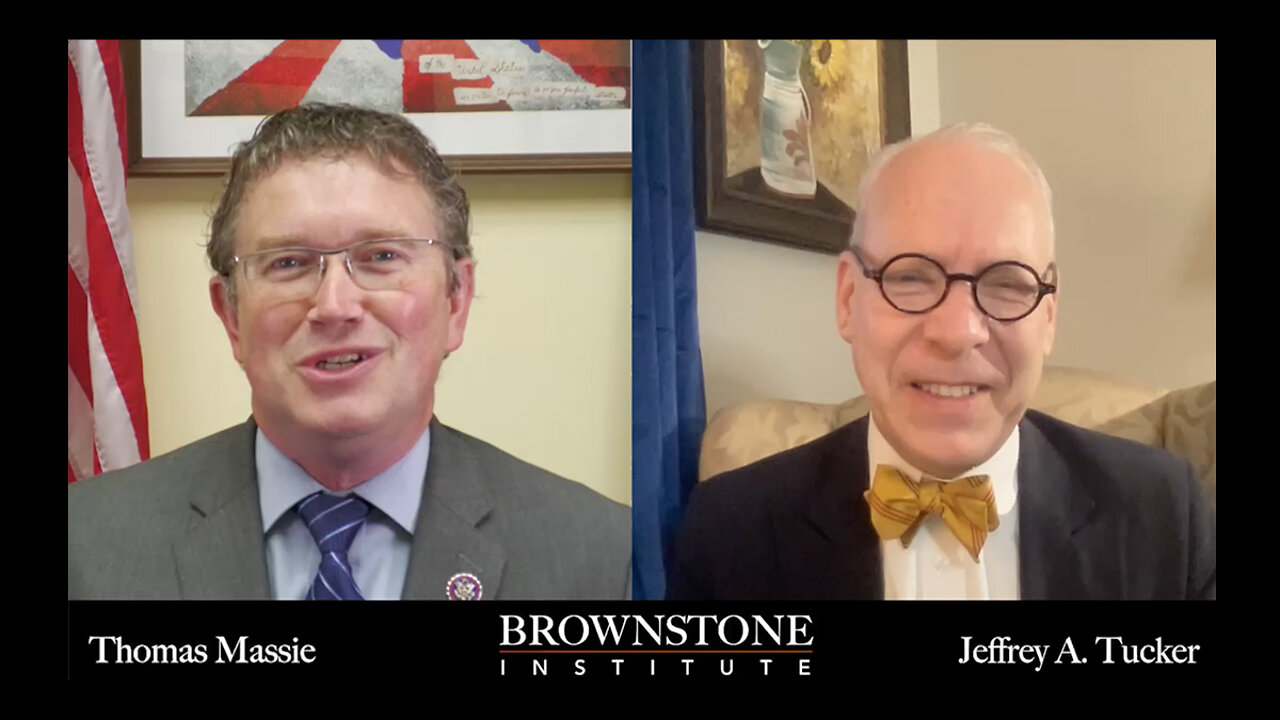
Nicole Shanahan Interviews Congressman Thomas Massie
Congressman Thomas Massie Announces The Passing Of His Wife Rhonda (Please Send Prayers)
Off The Grid With Thomas Massie
Follow The Science?: Oversight Of The Biden Covid-19 Administrative State Response (06/26/24)
Congress & The Pandemic Response: An Interview With Thomas Massie
US Representative Thomas Massie Asks House To Bar FDA, USDA From Funding Transgenic Edible Vaccines
Government Wants To Put "Kill Switch" In Vehicles
Representative Thomas Massie: 'Redacted. Redacted. Redacted. It's Not Incompetence. It's Insolence!'
U.S. Representative Thomas Massie: "We're Living Under Medical Malpractice Martial Law!"
Congresswoman Marjorie Taylor Greene Holds Hearing On Covid-19 Vaccine Injuries (11/13/23)
Congress & The Pandemic Response: An Interview With Thomas Massie
Congress And The Pandemic Response: An Interview With Thomas Massie
By Brownstone Institute
May 16, 2022
Congressman Thomas Massie of Kentucky is the rare example of a statesman in the US who saw the pandemic and response with scientific clarity from the very beginning. He was never shy about sharing his views both in speeches and on social media, even when it contradicted the priorities of his own political party.
He spoke out that "two weeks to flatten the curve" made absolutely no sense. He was also personally responsible for forcing a quorum back to Washington, D.C., only one week into lockdowns, thus earning wild attacks from all sides.
He has been consistent from the beginning to end, sticking to good science and principle but always with charm and intelligence. As a result, he is hugely popular within his district, simply because voters know that he will always tell the truth as he sees it. In that way, he should serve as a model and inspiration for others.
In this interview, Congressman Massie shares the inside story of those absolutely critical first weeks of lockdowns, providing a deep and penetrating look into why he believed what he did and what fallout that brought down on him during a national hysteria.
He further reveals details not reported before such as the role of the White House in lobbying for the disastrous CARES Act ("the we don't care act") from March 2020 that set the stage for economic collapse and the current crisis.
The Brownstone Institute is deeply grateful for his time and the compliments he gives to our work. First the video and then the transcript follows.
.................
Jeffrey Tucker:
Hi, this is Jeffrey Tucker at the Brownstone Institute, and I'm thrilled to be here with my friend Thomas Massie, Congressman from Kentucky. Thanks for taking the time to be with us.
Thomas Massie:
Hey, thanks for what you're doing at the Brownstone Institute. And thanks for having me on to set the record straight.
Jeffrey Tucker:
Well, this is what we need to do. I'm very worried about this because I'm getting concerned that we're not going to tell this history of what happened properly. There's a few things that I kind of want to get codified for the record about your involvement from the very early days. So if we could go back to March, 2020, and if you could explain to me what your intuitions were initially when we heard the slogans flatten the curve.
Thomas Massie:
Yes, we were going to flatten the curve, right? We were told that we would take just 15 days to slow the spread. On about the fourth day to slow the spread, I woke up early in the morning and did some math. I did some calculations. By the way, I went to MIT, did undergraduate and graduate degrees there in engineering. So I've had a little bit of math. I understand differential equations, but it wasn't even necessary to bust out the [inaudible 00:01:32] to figure out that 15 days was not going to slow the spread. I calculated, if this strategy was going to have any effect, it would have to last for months and months, that it would go at least through the summer, if it was going to have any effect at all. I waited for my wife to wake up. She also went to MIT. So I got her to check my homework as she did when we were at MIT. She said, "I think you're right."
Jeffrey Tucker:
You did this based on the existing case reporting and what was presumed to be the R-naught at the time, the infection rate.
Thomas Massie:
Yes, that's correct. At the time we had information from cruise ships, for instance, which are kind of like little test tubes or Petri dishes to look at, okay, if you assume complete exposure, how many are going to get it? How many will come down? How many will it be fatal with? So I made some quick estimates and some assumptions. My assumptions were probably too rosy even. Later that week or that day, I broke it to my staff. I told them, I said, I've done some math. This is not 15 days. So on Easter, our governors sent out state troopers to take down the license plates of people who defied him to go to church. Also, there was a woman who tested positive for COVID in Kentucky, and they wanted her to sign a document to say that she wouldn't leave the state.
She wouldn't leave her house. She agreed not to leave her house, but she refused to sign a document. She thought, well, what if I have to go … if there's an emergency, life or death situation. They sent police to her house and put an ankle bracelet on her in Kentucky to track her. So all of these horrific things we saw on the news happening in China were happening in the United States. Meanwhile, Jeffrey, and again, let me get us back to about the fourth day of 15 to slow the spread. We're being told we're going to vote on a giant spending package. The numbers were changing. We weren't sure what the numbers would be, how much would the money be. I was waiting, I was on call. I was ready to come to DC and debate that and vote on that.
Meanwhile, they were making preparations for continuity of government. Now, this is where things are going to sound conspiratorial, but I can point you back to articles that show what was happening in the event that the branches of government quit functioning. There's sort of a military government that would take over in this country to maintain law and order. They were making preparations for that. They were telling people, if you remember also, not to leave your state. There was a discussion whether to shut down all the New England states, whether basically to stop all traffic in and out of New York state. There were discussions, serious discussions about that. You can go back in the news and find these things.
Jeffrey Tucker:
So March 12th, flights from Europe blocked, or at least stopped, and so everybody had to come back by Monday or Tuesday causing massive overcrowding. The Fauci, Birx, and Trump press conference occurs on Monday the 16th, at which Fauci clarified, everything has to shut down, bars, restaurants, all public events. If there's evidence of community spread, he said. Birx is saying a new rule: Everybody has to stay separate from everybody else. That was on Monday. So by Friday, you're saying there's already talk of a gigantic spending bill.
Thomas Massie:
Yes, gigantic, unprecedented. So I'm sitting there at home. Actually, I believe it was a Wednesday or Tuesday evening. I think it was a Tuesday evening. I saw Trump's people come on TV. Larry Kudlow was one of them. He said, well, it's not really a $2 trillion bill you're underselling. It's a $6 trillion bill. We're going to give $400 billion to the Federal Reserve. They can loan that out at a 10-to-one ratio and inject another $4 trillion of liquidity into the economy. It'll be really $6 trillion. When I realized that the Republicans were bragging that this was $6 trillion, not really $2 trillion, don't undersell it, I thought we are in trouble.
Thomas Massie:
Then shortly thereafter, I get an email from House leadership that says, stay home. We don't need anybody here, and we're going to pass this. By the way, we still didn't have the wording of it. We're going to pass the bill with nobody in Congress. Now this concerns me on many different levels. Number one, if the branches of government quit functioning, that gives an excuse for the folks who are up there, circling in airplanes, ready to roll out the plan for continuity of government that doesn't include the legislative branch or even the existing people in the executive branch.
Jeffrey Tucker:
Yeah. Well, that's what they wanted. I mean, clearly that's the way they've behaved for two years, by the way.
Thomas Massie:
Yes. So it bothered me in that part. It also bothered me that this was the biggest spending bill in history. Even the omnibus bill was half that size. So the omnibus bill, which sets records every year, is typically like a trillion dollars or $1.1 trillion. And this was going to be over $2 trillion. If you listen to Larry Kudlow, it was a $6 trillion bill. The final thing that bothered me the most is it's just flat out unconstitutional to pass a bill with nobody there. The Constitution says that you have to have a quorum to do business. In other words, to pass bills that are going to have any legal effect.
Jeffrey Tucker:
Meanwhile, you've got public health authorities saying quorums are just going to be super-spreader events. So we can't have them essentially.
Thomas Massie:
Right. Although, by the way, there was a way for Congress to vote one at a time. We could have gone into the chamber one at a time and voted. There's no requirement that you all be in the room at the same time, unless you're trying to pass a bill without a quorum and somebody notes the absence of one. By the way, this was a technical detail I argued with Nancy Pelosi on for about 15 minutes, that it would be safer for us to vote on the bill than to have a quorum call, but we'll get to that point in chronologically three days from what I'm speaking about now.
So at 11:00 PM that evening, I resolved to go to DC and tell them you're going to have to vote on this. By midnight, I had my bags packed. I got in my car. It typically takes about eight hours to get to DC for me, but I hadn't slept. So I slept for one hour at a truck stop. By the way, I stopped at three places to buy gasoline in West Virginia and they were all closed. There are the signs erected on the interstate, get off the interstate, trucks only, stay home. If you could remember, the whole world was in a panic at this time, and people were ready to take advantage of it.
Jeffrey Tucker:
Yeah. Everybody's forgotten this. I'm so glad you're telling this. Those were terrifying weeks.
Thomas Massie:
The third exit I took off the interstate, I found a gas station where you could buy gas with a credit card. It was unattended. It was like the zombie apocalypse or something. So I filled up my tank with gas. I slept for an hour at a truck stop after that, and then I made it to DC by 9:00 AM. You can go back and look in the record on tweets, in my tweets. This is sort of documented. They knew I was there. So, they were accusing me of trying to delay the vote, but they had fiddle farted around for about a week. The Senate had passed this and the Senate showed up to pass it, by the way.
Two senators were not there who might have objected. Due to COVID, they weren't there. Rand Paul and Mike Lee were not in attendance because one of them had had COVID and one of them had been exposed to COVID. So that's another reason why I ended up bearing the brunt of this. So I showed up that morning, and this is documented in social media history, in my tweets. There's these breadcrumbs in the records you can go back and look at if anybody doubts this. I told people, for instance, tweeted out that the Constitution requires a quorum. I was trying to sort of acclimate my colleagues, in fact, that they were going to have to show up and vote. I did something I almost never do. I told our own whip team what my plans were. The whip team says, don't surprise us. Just tell us what you're going to do.
We just don't want to be surprised. Well, then they take that information and they weaponize it against you. I knew they were going to weaponize it against me. They did. They ginnedit up by Thursday when I, in no uncertain terms, told them we were all going to come and vote because I was going to require it. By the way, the parliamentarian who's ecumenical, he's neither Republican nor Democrat. He'd been there for four or five Speakers of the House. He agreed with me. He told them Massie's right. His interpretation of the Constitution is spot on. The Constitution says the House can make its own rules, but those rules can't violate the Constitution. The Constitution requires a quorum. So they knew I was right. They were going to have to come and vote. They ginned up the entire media against me.
Even Fox was demonizing me. You can go back and hear Geraldo Rivera saying how bad I was and how this was such a bad thing for me to do. Meanwhile, they did find some things about the bill they didn't like. They found $25 million for the Kennedy Center for the Arts. As if that was the problem with the bill, that it wasted a little bit of money here or there. Not that it was going to bankrupt our country or that it was going to basically put all the governors in a moral hazard where they had to shut down their own economies.
Jeffrey Tucker:
Right. Maybe we want to go there because I don't think this critique is widely understood. In other words, every time I make it, people are shocked by the point. I got the point from you. I had never thought about it. Your point is that … it was called the Cares Act. Am I right?
Thomas Massie:
Yes. I called it the Don't Cares Act.
Jeffrey Tucker:
Yeah. But your argument from the very beginning was that this would operate as a kind of a subsidy for the lockdowns. It would perpetuate lockdowns.
Thomas Massie:
Yes.
Jeffrey Tucker:
Can you explain how that works?
Thomas Massie:
Until a year later there weren't really any federal lockdowns or mandates or things like that. It was all being promulgated by the governors, but it was done, number one, with the imprimatur of Dr. Fauci and Dr. Birx. They were skirting around, skipping around to all the state health departments and giving the imprimatur of the federal government to do these things. In fact, if the governors had gone the other way after hearing the advice from the federal government, it would've opened them up to a lot of lawsuits, because here you had the CDC and the NIH and the top scientists in the federal government advising one thing. So you had the imprimatur of the federal health policy experts that worked for Trump at the time. They had too much slack to go do this. Then meanwhile, you had the funding from the federal government.
One of the arguments my Constitutional conservative colleagues were making, that I was a little bit sympathetic to at first, was that this is a taking, and the Fifth Amendment requires us to compensate people for takings. Here's the problem. The takings hadn't happened yet. We were bribing governors to do the takings. By the way, if the state does the taking, it's not the federal government's obligation to do the paying back.
Jeffrey Tucker:
Right.
Thomas Massie:
Ultimately, the only thing I thought that would bring the governors to their senses is when they shut down their own economies, they would not have tax revenue, and they can't print money, and they would be shutting down their own governments.
Jeffrey Tucker:
Right. But then suddenly, after the Cares Act passes, of course there's tremendous pressure now already from the bottom to give us money, give us money. We want this money. Then after it started arriving, there was no reason to open up. Suddenly, the federal government became benevolent and generous.
Thomas Massie:
Yes.
Jeffrey Tucker:
In a way we had never seen before in our lifetimes.
Thomas Massie:
Right. You had things like minimum basic income. If you look at some of these policies, it was like we're just going to give you money. By the way, it was a $2 trillion bill, but I said the $1,200 checks were the cheese and the trap. People saw $1,200, but if you multiplied … and I thought I would get some sympathy from the Democrats for this. If you looked at how much money was going out and compared it to the $1,200 checks that were going to go out, it was like 10 to one. The money was going somewhere else. It wasn't going to individuals, but nobody was doing the math on that. By the way, Jeffrey, just to close out this point, Ron DeSantis, who in my opinion is the best governor, bar none, in the United States, even he shut down Florida for a little while as soon as the Cares Act passed.
He was also put in the same situation, but he did something brilliant. He banned Dr. Fauci and Dr. Birx from coming to Florida and talking to any state employee. That was a stroke of brilliance. So you're not going to spread the imprimatur, the federal government, and establish that baseline here in Florida. You're banned. He banned them.
Jeffrey Tucker:
Yeah. So he was suspicious from the beginning about this, but it took him a long time to finally … that sounds like he opened up Florida entirely until about August, right? Or may have been sooner than that, July.
Thomas Massie:
Yeah. I don't remember the exact timeline, but again, I want to give him a lot of credit because he was at the forefront of this. But what I'm saying is the federal government really put all the governors in a bind by sending out this money. That was my problem with it is the policies were bad. You were going to pay people not to work. By the way, I pointed out at the time for about a month, I went on a road trip of shows, trying to explain to people all the bad things that were going to emanate from this. For instance, I own a farm and I'm connected to a lot of farmers in Kentucky. I realize if you don't plant fruit trees that summer, it takes three years for a peach tree to bear fruit and five years for an apple tree to bear fruit.
If those people who normally plant those trees aren't planting them, the tail on these shortages and price increases is at least five years long. I took some of my cattle to a processor that processes beef cattle, and I saw healthy dairy cattle being processed into hamburgers because, at the time, because of the shutdowns, we had dairy that couldn't go into the market. Farmers were feeding dairy cattle, milking them, and pouring the milk out because it was normally packaged to go to schools and to go to restaurants, and it wasn't packaged for selling in restaurants. They didn't even have enough equipment to package it, to sell it in restaurants.
So they then just pour out the milk. You can only do that for so long. Eventually, they were butchering dairy cattle. It takes three years from the time you decide you want a milk cow to create a cow that can milk. The mother has to gestate. It has to be born. It has to reach breeding age. It has to be bred itself. Then it gets its milk when it has its first calf. That's a 3-year process. Those were the things I was trying to explain at the time that we were touching off by telling everybody to stay home and not go anywhere.
Jeffrey Tucker:
That's just one sector. You've got tens of millions of them, you've got the chip issue abroad. God knows what happened to baby formula. So these supply chain issues were utterly wrecked by these closures, not just domestically, but internationally.
Thomas Massie:
Absolutely wrecked, and still we're feeling the long chain of this, the bolus. I don't even know that we're at the peak or the tail end of it yet because they sort of compound. These issues compound. Anyways, this was my great fear. By the way, it was a living nightmare for me to see this three years, five years into the future, the kids who are going to miss two years of education and socialization and whatnot. By the way, there was, at the time … this is another bit of irony. This CDC was telling everybody, including Congress, not to wear masks. Just to go back and look at the video of me there in Congress, demanding the roll call vote in the quorum and to see that nobody had a mask on.
Jeffrey Tucker:
Yeah, that's right. Yeah, I remember that was briefly … That was also the time when the virus was considered to be inside. No, it was considered to be outside, so we had to be inside, and then later the virus moved.
Thomas Massie:
Yeah, and it was droplets. By the way, Nancy Pelosi later created a Plexiglas box in Congress. After accusing me of putting everybody in Congress at risk of losing their lives, come January 3rd of the next year, she created a Plexiglas box with no top in the gallery of Congress, right below the air conditioning vent, where the air is being blown into the House of Representatives for people with COVID to come and vote for her to be speaker.
Okay. So back to the date of … it was, I believe, the 10th day of 15 to slow the spread where I made the motion. It went from Wednesday to Thursday. Again, they're fiddling around. They came up with this plan. Instead of passing it by unanimous consent, they were able to placate some of my colleagues by offering instead a voice vote instead of unanimous consent, which are virtually the same. In effect, they are the same. The only difference being they would debate the bill. They would spend four hours debating the bill. If you wanted, you could register … instead of voting against the bill, you could register your objection during the debate.
By the way, each side had two hours. The time was equally divided and everybody was here in Washington, DC because I was quoting the Constitution and it required them to show up. I went to the man managing the time on our side, the Congressman. I said, "When can I have a minute or couple minutes or a minute, or 30 seconds even to debate this bill?" He said, "Oh, we didn't know you wanted to speak on this issue. So you're not in the queue. We don't have time for you to debate it."
Can you imagine that? They all hate me for breathing air because I compelled their attendance on the biggest spending bill in history. They claim that they wouldn't even yield me 30 seconds because they didn't know I was interested in discussing the merits or demerits of this bill.
Jeffrey Tucker:
How was the vote finally taken? Was it just a voice vote?
Thomas Massie:
So this is interesting. I had to decide at what point I was going to exhaust all of my avenues of protest. I was on the floor watching the floor. By the way, I was whipped. But if people don't understand what whipping means, the name is appropriate. When you first hear, oh, they whip members of Congress to get them to do something. You think something bad, and then you find out, oh, it's just trying to get them to vote a certain way. But then once you understand what the whip process involves, I don't want to say it's waterboarding, but it's an exercise in psychological warfare.
They get your friends to call you. They call you in the middle of the night. They call you in the morning. I was sleep deprived. I had people calling me at midnight. I had people offering me better committee assignments. I received a phone call from the president. At the instant I was supposed to make the motion, it would be in order to make the motion, I got three phone calls from the White House. I presumed, I knew who that was, but I couldn't leave the floor because there's a moment where things are in order. And if you miss that 3-second window, it's gone for all of history. Nobody would even cover that moment if I went to the bathroom. I had to sit there for hours to make sure they didn't do a sneak, the quarterback sneak.
So I get these calls and I couldn't take them. Obviously I was busy, occupied, but eventually stepped out when they yielded some time to somebody. I realized there would be a few minutes where they couldn't sneak the bill through. I walked out into the speaker's lobby and I called the president back. That was a fun phone call. By the way, I'm not going to go into all the details of it because he has graciously, two years later, he's now endorsed me this week.
Jeffrey Tucker:
Well, anybody who's curious can look up the public record about the names you were called and who said what to whom. So I think that's out there and I encourage everybody to do so. Strange times, because all this happened under a Republican House, Senate.
Thomas Massie:
It was a Democrat House, but a Republican president, but the Republican minority leader was one of the people who was whipping me to vote. Not just to vote for it, but just not to object.
Ultimately, you have to decide what your battle is. As I approached that day, I decided that my battle was just to try and get a recorded vote. So I requested a recorded vote and something that has never happened in the eight years that I had been in Congress, and something that's never happened since that day, they denied my recorded vote. I had earlier, a few years before, asked the parliamentarian, "What would transpire if you were denied a recorded vote? How would they arbitrate that?" Because you have to count … The Constitution says if 20% of Congress wants a vote, you have to give the vote. I said, "Well, how would you count that? How would you physically … what would be the process for that?" He said, "Mr. Massie, it's so messy. We've never denied anybody a recorded vote, and we likely never would." Well on this day, they did.
I'm not saying that 20% of Congress did stand. In fact, 20% of Congress did not stand. They were all in their seats. Maybe there were five or 10 out of 435 who stood. Then something else that's unprecedented in the history, since the beginning of Congress, happened that day. They counted people present who were only in the gallery. Typically, you have to be on the floor to participate, but they recognize people in the gallery as being present. Long story short, they denied the recorded vote. I made note that a quorum was not present. They said a quorum was present. At that point, there may have been other parliamentary avenues for me to pursue. But at that point, I let them own their mistake. At that point I had done everything I could do. By the way, when I stood up, they didn't give me even 30 seconds or five minutes to debate this bill.
So I did something that is not in order. Instead of just making a motion that a quorum is not present, I got about 20 seconds of speech out before they ruled me out of order. Then I made my order. I said, "Madam Speaker, I'm here today to make sure that our Republic does not die by unanimous consent in an empty chamber. And I object on the basis that a quorum is not present." I saw them about to gavel me down, but at least I got one sentence into that debate and injected it while I was making my motion.
Jeffrey Tucker:
Absolutely beautiful. Can I ask a slightly naive question? I don't understand. Nobody understands how this stuff works, but March 12th, we got the shutdown time. HHS on March 13th releases a document that says, oh, if community spread gets bad, we're going to shut everything down. But Trump has not given the order yet. March 16th, he goes out to the press conference, having been persuaded over the course of the weekend. Oh, now we should shut down. Ten days after that you've got a bill. How big?
Thomas Massie:
It was enormous, but I didn't print it out. I don't even know that there was time to print it out, but it was, I think, $2.2 trillion in hard dollars. They said $6trillion in spending authority, basically.
Jeffrey Tucker:
Here's the question I have. Who wrote this? If somebody had to … where does this stuff come from? If all the politicians are panicked at home, worried about COVID, and the government shut down, what are these bills? Is there some machine out there that cranks them?
Thomas Massie:
It was written in part by the White House. The White House had a lot of input into it. In fact, I was told … By the way, one of my best friends is Mark Meadows. You can believe they employed him to whip me. He was chief of staff at the White House at the time. By the way, I have to say, I love Mark Meadows dearly. The two of us architected the coup that took out John Boehner.
So we've been in the trenches together and he didn't really try to whip me that hard, but I told him, I said, "Mark, this is the biggest spending bill I've ever seen. It's way too much money." He said, "Well, it is. It's more money than we need. The reason it's so big is so we don't have to come back and pass another one."
He probably thought that at the time. I didn't believe it. Later we came back and spent another $4 trillion after that first $2 trillion. So he was not correct in his assessment, but he had input into it. I'm telling you that the White House had input into it just based on my discussions with chief of staff Meadows. There were people from Wall Street that had input on it. This is where I would've expected AOC and Bernie Sanders to speak up, because this was the biggest transfer of wealth from the middle class to the upper class in the history of humankind. The Roman emperors couldn't pull this off.
Jeffrey Tucker:
Do you believe that all this happened between the 16th and the 24th? Do you really believe that a bill this size with this level of specificity was hatched in those 10 days?
Thomas Massie:
I don't know. I can't go too deep into that, but I can tell you, I think one of the reasons they were so upset with the prospect that I might delay the bill is that some transactions had already occurred and that it would be illegal. What they had done would be illegal if they didn't quickly also pass the bill to consummate the transfers that were happening. Because you see, this is March 27th. It's a Friday. Then there's a weekend, and the quarter ends on March 31st. It was so irrational that they would get so upset, or maybe somebody stood to collect interest on $2 trillion over the weekend. What would be the interest on $2 trillion in somebody's bank? But it doesn't make sense. Maybe someday somebody can go back and exhume the artifacts of the transactions and the wire transfers and what actually happened.
Jeffrey Tucker:
There's a lot of strange things. I even think about this HHS, March 13th document, which is apparently secret. I don't know if you even saw it at the time, but the New York Times reported on it about a month later. They already had a blueprint out before Trump had been persuaded.
Thomas Massie:
I don't know if we're going to get … I want to make sure we don't forget about this when we're laying down what's happened here, because this is one of the most important things. If you go look at the Fed's balance sheet in March, they did a couple things. One, the balance sheet tripled overnight, somewhere in that period. They say part of that's due to the redefined certain terms. On the money supply, they show the money supply also went up enormously, and they said, well, that's because we changed.
Jeffrey Tucker:
I think that was in May. Am I right about that?
Thomas Massie:
Yeah. Well, you may be right, but here's the main point.
Jeffrey Tucker:
The balance sheet anyway. It was already expanding before the bill was passed.
Thomas Massie:
Yeah. I don't know when the definition changed, but here's what happened. There wasn't $6 trillion to borrow over the last two years. There's borrowing authority, but then there's also, who's going to loan you that money. Up until that point, we had accumulated $24 trillion of debt, primarily by borrowing from other countries, by borrowing from corporations, by selling treasuries to individuals who wanted a safe investment. So we had accumulated $24 trillion, but when you go out to borrow another $2 trillion, it's not sitting around. People don't have it to loan to you. So what happened and what has happened again, and is happening over the last two years, is the Federal Reserve created roughly $6 trillion out of thin air.
Jeffrey Tucker:
Right, according to M2 anyway. Right.
Thomas Massie:
Yeah, and according to their balance sheet. They had a fairly large balance sheet with some bad debt and stuff they had accumulated, but nothing compared to the $5 or $6 trillion that they've added to it. I've got a debt clock here in my office and, in the last two years, it's jumped from $24 trillion to $30 trillion. But the alarming thing, or maybe it's comforting to you, we didn't really borrow $6 trillion. The Federal Reserve created it and then we borrowed it from the Federal Reserve. The Federal Reserve, their balance sheet includes more Treasury securities than anybody else holds. Not Japan, not China. Nobody holds as much Treasury securities as the Federal Reserve right now. It was a shell game. The reason I know I'm chronologically a little bit out of order, because I'm talking also about the next $4 trillion that was spent, but it started on March 27th.
They didn't find $2 trillion on March 27th to borrow. This is why you have inflation and why it's not going away. It's baked in. There's 30% inflation baked into everything now. That was one of my concerns at the time. I articulated it. Go back in the annals of Twitter and you will find that I am saying this will create inflation and it will create shortages. So some people say, well, what did you accomplish? You didn't even force the recorded vote. Well, I think I proved that government could still operate, that we didn't need some contingency government to kick in. I protected the Constitution that day. But also look at what happened after that.
On March 28th, or the next Monday, the White House announced, you know what? We're not going to shut down New York and other New England states. We've decided to leave them open. So it's sort of like, by compelling all of those members of Congress to engage in interstate travel, I showed that it was still possible. Now some of those members of Congress, there were four members of Congress looking at each other on an empty plane. But because we kept things going, they had to acknowledge you could still travel. So that, I feel like, is one of the things that was accomplished.
Jeffrey Tucker:
It's hard for people to remember these days. In fact, maybe you sense this too, I see an active campaign to forget, to pretend as if this never happened. Even Fauci yesterday in testimony said "We never locked down. There weren't really any lockdowns."
Thomas Massie:
By the way, I just remembered the name General Terrence J. O'Shaughnessy. You can put that in a search engine and a Newsweek article. Also, he showed up on Fox. That was going to be your leader of the contingency government. They were introducing him to people that week. Go look at it. It's in the record. They can't memory haul it.
Jeffrey Tucker:
Okay. Okay. Well, there is so much more we could talk about. I think we should maybe I hope do that someday, but I think we should stop here because I know you're busy and we have covered this early section really, really well. I just think it's extremely important we know this history because, as I say, I'm sensing there's an effort to bury all this, pretend like it never happened.
Thomas Massie:
Yeah. There was a phone call with members of Congress and Dr. Fauci, just to sort of close this out. I remember two of the questions that were asked, one by me and one by Representative McClintock from California. Representative McClintock from California asked, and this was around about that time. It may have been April or May, but McClintock asked, "Dr. Fauci, in these policies, have you taken into account the side effects of shutting down the government on the health of people? For instance, poverty is one of the leading indicators of shorter lifespans, and this is going to create some level of poverty. We're going to impoverish people by shutting down our economy. Have you taken that into account?" Dr. Fauci said, "I'm just singly focused on this one virus and that's what I'm working on."
Thomas Massie:
That was a wake-up call to me, very dangerous. The question that I asked was, "I know you can't tell us the date at which you think everything should be opened up, because there's so many issues, but what are the criteria that we need to meet in order for you to recommend opening our country back up?" He had no criteria because they really had no criteria other than panic for shutting it down. That's when I knew we were in for a long haul and we were in for a lot of trouble as long as Dr. Fauci was in charge.
Jeffrey Tucker:
You figured it was going to last till November.
Thomas Massie:
At least until November. Oh, Jeffrey, let me tell you one more thing. It's so important. So important. Congress and my Republican colleagues in particular were arguing that it was too dangerous to vote in person in March. Then they turned around and, by November, all 50 states implemented methods and procedures for our constituents to vote remotely. For the first time we had a remote election, but Congress was setting the prototype for it on March 27th. This was a chess move.
Jeffrey Tucker:
Amazing, amazing.
Thomas Massie:
I'll be honest, on March 27th I didn't recognize it, but very quickly within a couple weeks, I realized they were setting the precedent for remote voting in all 50 states by arguing, if it's too dangerous for members of Congress who have paid government healthcare, security guards, very good ventilation wherever they meet, if it's too dangerous for them to show up and vote, how could you then later argue that American people have to show up and vote? So anybody who's upset about election fraud or how the elections were carried out, or these drop boxes or the mailing in, your Republican members of Congress were arguing that it was too dangerous for them to vote. Then they set the precedent for everybody else to vote remotely.
Jeffrey Tucker:
It's weirdly ingenious, or maybe it's accidentally brilliant, or God knows. I don't know. Well anyway, thank you Congressman for helping us. You're guiding us through these early days, which are so important. I'm very happy that you're able to set that record straight. I hope we visit again very soon.
Thomas Massie:
Thank you for documenting this for history. I hope you etched this into a gold CD rom and can put it in a copper container that can't be corroded and save it in a time capsule, because the winners write history, right?
Jeffrey Tucker:
That's right.
Thomas Massie:
They're going to try and rewrite history. They already are. They're changing definitions. They're setting up a ministry of truth. They're doing all this so that they can establish history. God bless you for trying to establish the real history with the facts of what happened.
Jeffrey Tucker:
We've just begun. Thank you, Congressman.
Thomas Massie:
Thank you.
................
The best of the best of the best COVID-19 resources, videos, and memes:
Resources:
https://sunfellow.com/top-covid-19-resources/
-
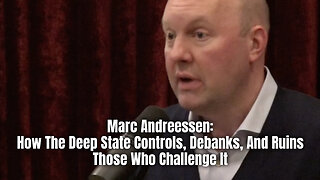 14:10
14:10
Sunfellow On COVID-19
10 days agoMarc Andreessen: How The Deep State Controls, Debanks, And Ruins Those Who Challenge It
7.6K4 -
 29:05
29:05
The Gateway Pundit
2 years agoTGP's Joe Hoft Interview with Thomas King on PA Election Audits
53.5K25 -
 1:17:55
1:17:55
Game On!
12 hours ago $2.94 earnedThursday Night Football NFL Week 14 Rams at 49ers!
20K2 -
 6:46
6:46
Dr. Nick Zyrowski
1 day agoWhat Happens If You Drink Lemon Water for 14 Days?
11.4K4 -
 12:25
12:25
IsaacButterfield
1 day ago $4.29 earnedGEN Z SHOULD BE ASHAMED!
8.41K4 -
 5:13
5:13
BIG NEM
13 hours agoIs AI Coming for Comedians Too?
6.55K2 -
 28:29
28:29
Goose Pimples
1 day ago7 SCARY Videos That’ll Make Your Knees Wobble
77.4K7 -
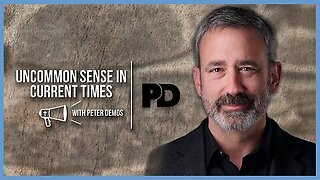 52:00
52:00
Uncommon Sense In Current Times
21 hours ago $12.64 earned"Inclusive or Excluding? The Hidden Agenda Behind 'Happy Holidays"
63K12 -
 2:36
2:36
Canadian Crooner
1 year agoPat Coolen | Frosty the Snowman
36.9K5 -
 55:02
55:02
Bek Lover Podcast
21 hours agoAl Qaeda Take Over of Syria Backed by US & Israel? More Strange News...
26.4K7

